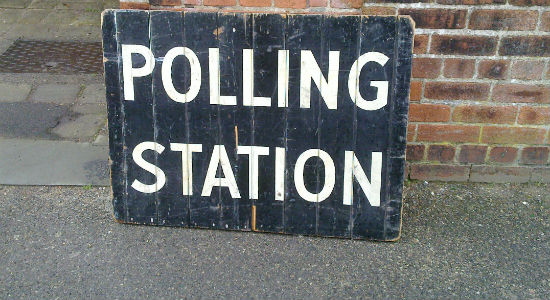So much for #pencilgate: the referendum wasn’t rigged – but Britain’s electoral machinery needs fine-tuning
Despite widespread fears to the contrary, the EU referendum passed off without major problems. But the vote revealed underlying problems with Britain’s electoral system – most notably the difficulty of registering to vote. Toby S James and Alistair Clark, authors of a new report by the Electoral Commission on the quality of electoral administration at the referendum, say the burden on cash-strapped officials is growing. Indeed, nearly half of local authorities say they don’t have enough funding to maintain the electoral register.

Photo: Tony Kennick via a CC-BY-2.0 licence
At times, the EU referendum was troubled by concerns about whether the electoral machinery would work properly. The poll would be rigged, some thought, and a social media storm called #pencilgate brewed. The media leaped on stories that ineligible voters were being issued poll cards or flags being displayed in polling stations. Infamously, the government’s voter registration website crashed on the deadline for applications. This, in the wider context of concerns, raised from many quarters about electoral fraud in Britain, most recently from Eric Pickles.
A new independent report – conducted for and funded by the Electoral Commission – on the quality of electoral administration at the EU referendum shows that these concerns were eventually unnecessary, or minor blips in the administration in a poll that went to plan, despite the international media coverage, high stakes and immense pressure on electoral officials. Put simply, there were virtually no problems with electoral fraud and very limited cases of voter intimidation. Polling day went smoothly, with the exception of some isolated cases of ‘bullish’ campaigning outside polling stations (and pens literally being thrown at electoral officials inside them). The count went without a major glitch. Management structures were devised to run what was only the UK’s third nationwide referendum event – structures that had improved since they were last used for the 2011 AV referendum. This is a story which will receive insufficient attention, and electoral officials who are crucial to democracy will not get enough credit for it.
But not all is well with Britain’s electoral machinery. In fact, the focus on fraud prior to referendum provided a smokescreen which diverted attention from underlying problems that resurfaced during the Brexit campaign. The process of registering to vote is probably top of the list. At a time when an estimated 8 million people were missing from the electoral register, with large disparities in registration rates by age, ethnicity and socio-economic statuses, electoral officials faced confusion among the public about how to add their name to the register. Many citizens did so successfully and it swelled by three million new registrations in the throes of the campaign. But, just as at the 2015 general election, many didn’t register themselves successfully and turned up to the polling stations to be turned away. Some of these were citizens who had been removed from the register in December 2015 under the introduction of individual electoral registration. Others, unsure of whether they were registered or not, registered again just in case. Electoral officials were swamped with many duplicate registrations.
These pose a particular problem for electoral officials who are strapped for resources. It absorbs time for work that they are undertaking to prepare for polling day – or stops them undertaking other tasks. In an environment where local government spending has seen cuts in recent years and staff have often not been replaced, the report finds – alarmingly – that nearly half of local authorities claimed that they have insufficient funds to maintain the electoral register. And money makes a difference when it comes to delivering elections.
The report also reveals that working on the frontline of elections is currently a challenging task. As noted above, the electoral registration system crashed on the night of the deadline, leading to emergency legislation to extend it. This reprise allowed 230,000 additional citizens to be enrolled. But it came at the cost of enormous strain on many electoral officials, working additional hours long into the night and weekend. As one put it: ‘There was just no let-up in the work load and it just got progressively more and more. It’s no wonder so many people went off with stress related issues’. The referendum came in quick succession to the May elections which meant that many staff had yet to take holidays and many officials faced problems recruiting poll workers. There is already evidence that lower election quality results when elections are held concurrently.
So there are signs that the ship upon which electoral democracy sails has some holes that need fixing. Earlier in the year the All Party Parliamentary Group on Democratic Participation published a 25-point action plan on how the electoral registration system could be modernised. It included measures such as an online system where citizens can check their registration status, the automatic registration of citizens, more resources to fund elections and regularly monitoring staff satisfaction and skill within the profession. As post-Brexit politics takes shape, these are lessons from the referendum that must not be forgotten.
This post represents the views of the authors and not those of Democratic Audit.

 Alistair Clark (left) is a Senior Lecturer at Newcastle University. Twitter @clarkalistairj
Alistair Clark (left) is a Senior Lecturer at Newcastle University. Twitter @clarkalistairj
Toby S. James is Senior Lecturer at the University of East Anglia. Twitter @tobysjames





 Democratic Audit's core funding is provided by the Joseph Rowntree Charitable Trust. Additional funding is provided by the London School of Economics.
Democratic Audit's core funding is provided by the Joseph Rowntree Charitable Trust. Additional funding is provided by the London School of Economics.
[…] Less of the pen-throwing. The referendum was administered almost flawlessly: and that’s the real issue. Electoral officials are swamped. Democratic Audit […]
ICYMI presented @ #BrexitNewc today Referendum well run but Britain’s electoral machinery needs fine-tuning https://t.co/PxfipUPRQt
@cabinetofficeuk @cskidmoremp You might also find this interesting on registration & elect admin more generally https://t.co/PxfipUPRQt
So much for #pencilgate: the referendum wasn’t rigged – but Britain’s electoral machinery needs fine-tuning https://t.co/KrNxVLA7EO
The @ElectoralCommUK published its report into #EUref today – vote ran smoothly but registration still a big issue https://t.co/5BQbKERSki
So much for #pencilgate: the referendum wasn’t rigged – but Britain’s electoral machinery needs fine-tuning https://t.co/5BQbKERSki
Surely now is also the time to start seeing what technology has to offer, looking beyond just on-line registration?
Whether its a national referendum, or a meeting of the Parish council the technology to vote on-line, linked to a credible registration data base, offering real time verification is now widely available; in addition voting technology offers significant potential to streamline the voting process, save costs and reduce administration.
Time for a concerted drive by the Electoral commission to champion this, instead of waiting for a steer from Parliament, and its much to be regretted that the Law Commission’s pending review specifically side stepped technology in favour of an exercise in consolidation.
So much for #pencilgate: the referendum wasn’t rigged – but Britain’s electoral machinery needs fine-tuning https://t.co/kp1fbSmPjN
Nearly half of local authorities say they don’t have enough funding to maintain the electoral register https://t.co/5BQbKERSki
Best to stop ALL foreign aid then and redistribute it to our local regional councils
The #Brexit referendum was well run, but challenges remain with voter registration, @ClarkAlistairJ and I conclude: https://t.co/uuxjj1yycJ
So much for #pencilgate: the referendum wasn’t rigged – but Britain’s electoral machinery… https://t.co/5BQbKF9tbQ https://t.co/HmgtDgh6hn